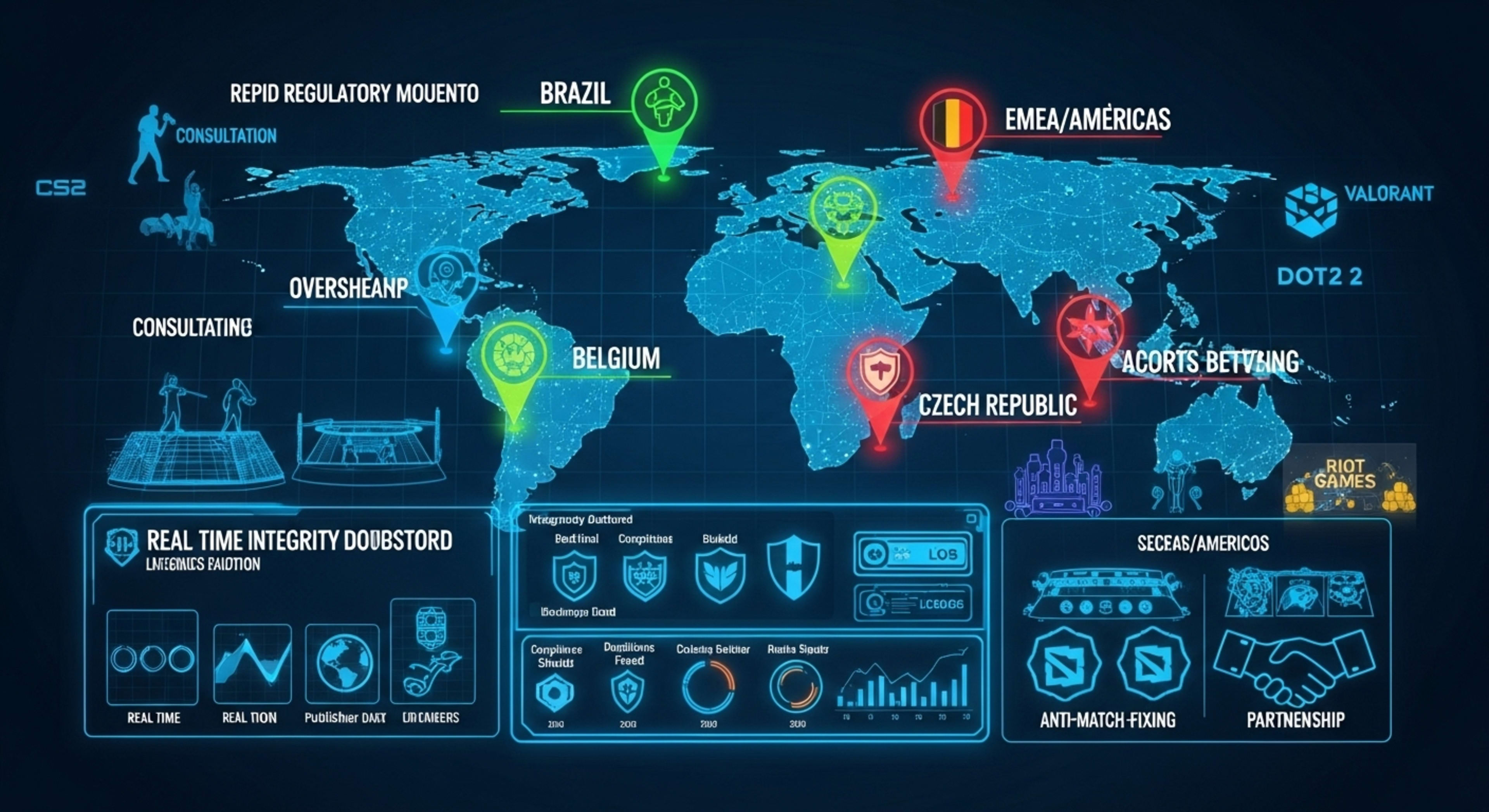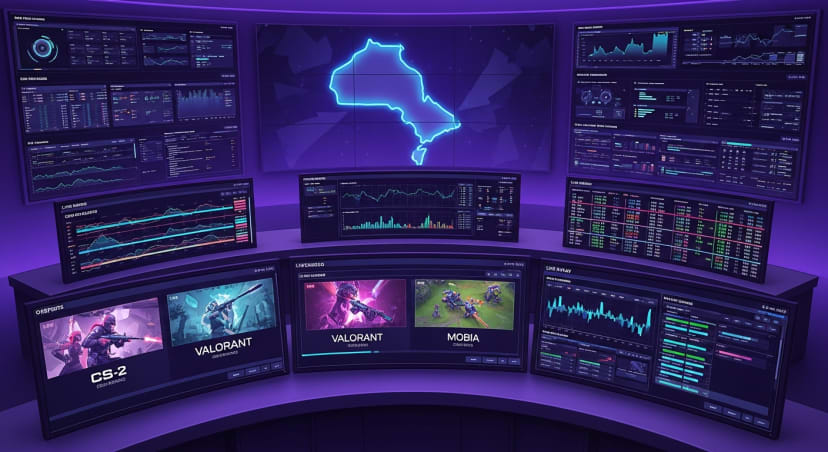Esports Betting Markets Navigate Regulatory Evolution

Recommended casinos
Key Takeaways
- Brazil's public consultation on esports integration signals a maturing Latin American market, projected to surpass BRL 10 billion annually by 2026, with enhanced anti-match-fixing protocols.
- Belgium's six-year gambling strategy and the Czech Republic's inclusion of esports under licensed betting underscore EU efforts to balance innovation with player protection.
- Riot Games' policy, which allows vetted betting partnerships for LoL and VALORANT teams in the EMEA and Americas regions, aims to curb unregulated wagering while safeguarding competitive integrity.
Brazil Launches Esports Betting Consultation
Brazil's Secretariat of Prizes and Bets (SPA) has launched a public consultation to integrate esports into its regulated betting framework, marking a pivotal step for the Latin American region's burgeoning esports industry. Announced on November 12, 2025, the initiative seeks stakeholder input until March 5, 2026, on critical areas including operator licensing, data transparency, and measures against match-fixing. This comes amid rapid market expansion, with fixed-odds betting legalized since January 1, 2025, generating R$17.4 billion ($3.2 billion) in the first half of the year across 78 licensed operators and 182 platforms.
The move addresses integrity risks in a sector where esports wagering is expected to contribute significantly to the projected BRL 10 billion annual market by 2026. By mandating collaboration with publishers and integrity bodies, the SPA aims to foster a secure ecosystem, reducing reliance on unregulated offshore sites that have prompted over 15,000 domain blocks since October 2024. For operators, this offers clearer pathways to compliance, potentially unlocking new revenue streams through localized odds and live betting on titles like Counter-Strike 2 and League of Legends, while prioritizing consumer safeguards in one of the world's fastest-growing esports audiences.
Source: EsportRanker
Belgium Unveils Six-Year Gambling Strategy
The Belgian Gaming Commission introduced a comprehensive six-year gambling strategy on November 10, 2025, with a specific focus on esports betting, aiming to mitigate risks such as match-fixing and underage participation. Aligned with the EU's broader push for harmonized regulations, the plan emphasizes stricter licensing for operators offering esports markets, mandatory data-sharing with integrity monitors, and AI-driven anomaly detection in betting patterns. This builds on Belgium's robust framework, which already classifies esports under sports betting but lacks tailored oversight for digital competitions.
The strategy's implications extend across Europe, potentially influencing neighboring markets, such as the Netherlands and France, by setting precedents for collaborative enforcement with bodies like the Esports Integrity Commission (ESIC). Operators like Betway, active in the region, must now integrate enhanced compliance tools, including real-time odds verification via approved data providers. With esports betting volumes rising 25% year-over-year in Belgium, this proactive approach not only bolsters trust but also positions the market for sustainable growth, ensuring fair play in high-stakes tournaments while protecting vulnerable bettors through mandatory affordability checks.
Source: EsportRanker
Czech Republic Integrates Esports into Licensed Betting
The Czech Ministry of Finance has expanded its gambling regulations, effective November 7, 2025, to formally include esports under "events of public interest" for licensed sportsbooks. This expansion enables operators like Sazka, Fortuna, and Tipsport to offer dedicated markets on titles such as Dota 2 and VALORANT. This update to the 2017 Gambling Act requires technical audits for game integrity and alignment with anti-money laundering (AML) standards enforced by the Ministry and the Gaming Control Administration. Esports betting, previously bundled with traditional sports, now benefits from explicit guidelines on live in-play wagering and odds transparency.
This development enhances market opportunities in Central Europe, where esports viewership is expected to surge 40% in 2025, driving demand for innovative bet types, such as player props. By mandating RRTV oversight on advertising—banning youth-targeted promotions—the framework promotes responsible engagement, thereby reducing black-market activity, which is estimated to account for 30% of total wagers. For stakeholders, it streamlines licensing for cross-border operators, fostering partnerships with tournament organizers and potentially increasing tax revenues from a sector projected to add CZK 2 billion annually. The emphasis on operational records and remote system monitoring ensures a level playing field, vital for maintaining bettor confidence in regulated environments.
Source: Altenar
Riot Games Opens Doors to Betting Partnerships
Riot Games has implemented a policy shift effective throughout 2025, permitting partnered League of Legends and VALORANT teams in the EMEA and Americas regions to pursue sponsorships with approved betting operators, a departure from its prior anti-gambling stance. Announced in late 2024 but rolling out this year, the framework requires all partners to use GRID for data provision, teams to establish internal integrity programs, and Riot's vetting for compliance with local laws. This responds to $10.7 billion in global betting turnover on Riot titles in 2024, much of which occurs through unregulated channels.
The change aims to channel wagering into licensed ecosystems, mitigating risks to competitive integrity while generating new revenue for teams amid rising operational costs. In EMEA, where esports betting represents 15% of total sports wagers, this could accelerate sponsorship deals with EU-regulated firms, subject to broadcast restrictions and responsible gaming mandates. By prioritizing player education and anomaly reporting, Riot sets a benchmark for publishers, potentially influencing the APAC market, such as South Korea. Operators gain access to premium inventory, but must navigate strict guidelines to avoid compromising fan experiences, underscoring the need for a balanced approach to monetization in the $16 billion global esports betting sector.
Source: Esports Insider








